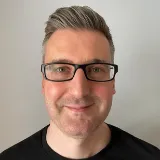King's vision is to make the world a better place. But a better place for who? Asking the teenagers who will live in tomorrow's world how they feel about the future technologies we promise them, is a start. That is what we have done with the Digital Twin Creative Writing Challenge, and they didn't disappoint. They were brilliant.
Dr Christine Aicardi, Senior Research Fellow
06 December 2024
Digital Twin short fiction competition winners announced
The winners of the Mirror Machine Digital Twin science fiction short story competition for young authors have been announced.

Young people between the age of 13 and 17 were invited to participate in a short story writing challenge on the theme of Digital Twins as part of an ongoing public engagement initiative between King's College London, City Schools and the UK Digital Twin Hub.
The competition was based on the theme, Mirror Machine: digital twins that model, shadow and affect the real world, and funded by the Faculty of Natural, Mathematical & Engineering (NMES) Enterprise & Engagement Partnerships Fund.
Entrants were given the writing prompt, "What if an all-seeing, all-knowing machine could connect every dot of data and replicate the world – the flow of planes and of cars, of energy and of people, of healthy cells and of diseased cells? What if that reflection then re-entered through the data dots to alter the world, for better or for worse?” and asked to create an original work of fiction of up to 1000 words.
The winning stories were selected in two age categories, 13-14 and 15-17, along with three runners-up.
The winning and runner-up authors were welcomed at a special event on the King's Strand campus. The event featured a keynote lecture introducing Digital Twins for a wider audience given by Paul Wilson, Chair of Smart Cities World Advisory Board, and a panel discussion including the two winning authors in conversation with PhD students from the School of Biomedical Engineering & Imaging Sciences whose research includes AI and digital twin technologies for healthcare.
The event was hosted by project leads Dr Christine Aicardi, King's College London, and author and applied science fiction specialist, Stephen Oram.
The memory of King's alum and science fiction author, Sir Arthur C. Clarke, who famously created the AI character HAL 9000 for the film and novel 2001: A Space Odyssey, was also represented on the panel by Tom Hunter, the current director of the Arthur C. Clarke Award prize for science fiction book of the year, who spoke about the wider role science fiction literature can play in public engagement and STEM communication.
Winning writers received a £60 cash prize, along with a copy of the Clarke Award's short story collection, 2001: An Odyssey in Words.
Fiction is a fantastic vehicle for exploring and imagining potential futures, and who better to do that than those who will be living in it. The submitted stories, and especially the five winning stories, showed not only a depth of understanding about the technologies and their place in society, but also a wonderful ability to write. What a privilege it was to be involved.
Stephen Oram, near-future science fiction author
Stephen Oram writes near-future science fiction. He also works with artists, scientists and technologists on projects that explore possible future outcomes of their research through short stories.
Housed at Connected Places Catapult since 2022, the Digital Twin Hub is an industry-focused platform for innovation, collaboration and knowledge sharing, accelerating adoption of connected digital twins across multiple sectors. It has 6000 members from over 90 countries.



